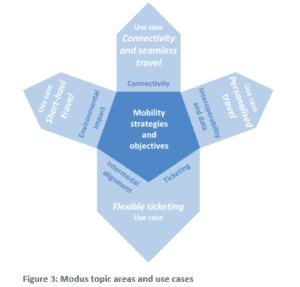
The deliverable from Modus Work Package 5 concerning identification of gaps and barriers can now be downloaded from https://bit.ly/3lFf7Qm
One of the main goals of the Modus project is to analyse how the overall performance of the European transport system can be optimised by considering the entire door-to-door journey holistically and considering air transport with an integrated, multimodal approach. In this regard, it is essential to identify the main barriers in achieving European (air) mobility goals and determine how air transport can evolve by efficiently connecting information and services with other transport modes to achieve a seamless experience for passengers. For these particular purposes, a set of use cases is identified and defined within deliverable D5.1.
As a first step, relevant mobility strategies and goals for an integrated, intermodal transport sector are reviewed and high-level topic areas identified, including ticketing, interoperability and data, connectivity, intermodal alignment and environmental impact. Based on these, four Modus use cases are defined in a second step, representing key aspects of the door-to-door journey in Europe ranging from the analysis and discussion of the impact of flexible ticketing on accommodating passengers in the event of disruption to the potential policy-incentivised replacement of short-haul travel (air) on selected routes within Europe.
In addition to this, the role of connectivity and seamless travel is considered to be essential, as is the degree of personalised travel.
The specification of these use cases enables a detailed discussion with experts from various transport domains as to how these use cases enable an integrated, multimodal transport system and how to assess the impact on available capacity or travel times across the various Modus scenarios (defined in deliverable D3.2) in Modus WP5.
